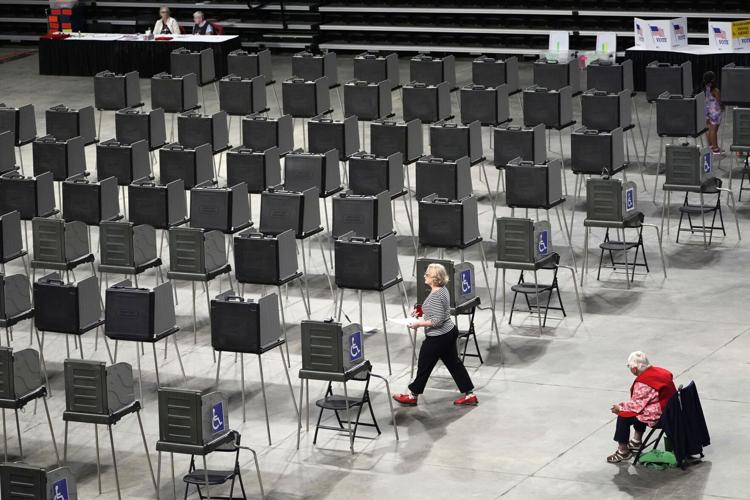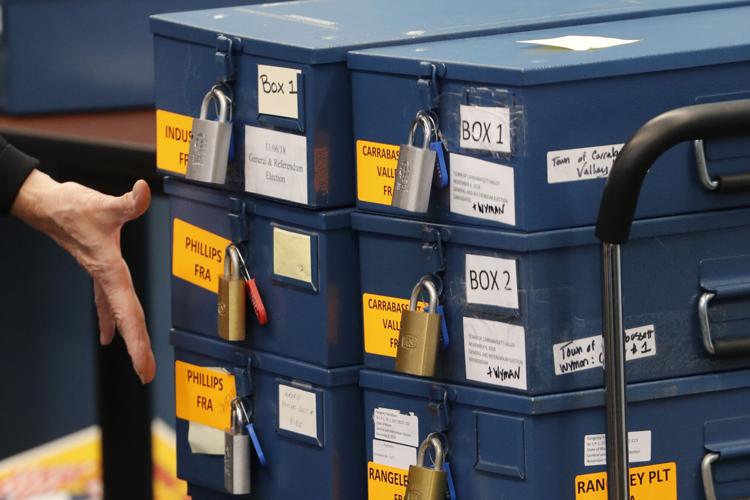An uncommon system of voting could be central to which party controls the U.S. House this fall — or even the presidency.
In Maine and Alaska, voters in competitive congressional districts will elect a winner using ranked choice voting.
"This decentralized nature of the elections is itself a deterrent," said Republican Trey Grayson, a former Kentucky secretary of state and the advisory board chair of the Secure Elections Project.
Rather than cast a single vote for their preferred candidate, voters rank their choices in order of preference on the ballot. If a candidate is the first choice of more than 50% of voters in the first round of counting, that candidate wins.
However, if no candidate surpasses 50%, the count continues in round two. The candidate with the fewest votes is eliminated, and voters who chose that candidate as their top pick have their votes redistributed to their next choice. This continues with the candidate with the fewest votes getting eliminated until someone emerges with a majority of votes.
Ranked choice voting has become more popular in recent years, particularly at the municipal level.
Voters in two dozen cities and counties — from New York and Minneapolis to Boulder, Colorado — used ranked choice voting in 2023, according to FairVote, a nonpartisan organization that advocates for the expansion of ranked choice voting. Seven other cities voted in favor of preserving, adopting or expanding ranked choice voting.
Proponents of ranked choice voting contend the system encourages candidates to build broader coalitions, eliminates the spoiler effect and discourages negative campaigning. Opponents say it's confusing and can result in a candidate without the largest number of first-choice votes ultimately prevailing.
Because they take place over multiple rounds that are tabulated only once all first-choice votes are counted, elections in Alaska and Maine that advance to ranked choice are often resolved a week or more after Election Day.

A voter has dozens of booths to choose from as she prepares to cast her Maine primary ballot June 11 in Bangor. Maine and Alaska use a ranked choice voting system for some election races.
Maine
Maine adopted ranked voting in elections in 2016 in a statewide referendum. It is used in all statewide primaries with more than two candidates. In general elections, it is used for federal offices, including the presidency, but not in state races, such as for governor or the Legislature, because it runs afoul of the Maine Constitution.
It quickly came into play — twice — in Maine's 2nd Congressional District. Then-GOP Rep. Bruce Poliquin won the most first-choice votes in 2018, but lost to Democratic state Rep. Jared Golden when votes were reallocated after removing the third- and fourth-place finishers. The process repeated four years later when Golden beat Poliquin in a rematch.
A federal judge twice upheld the constitutionality of ranked voting in separate challenges by Poliquin in 2018 and a group of voters in 2020.
This year, only two candidates are explicitly on the ballot in the 2nd District — Golden and Republican Austin Theriault — but the race could nonetheless go to ranked choice voting because votes will be counted for a third candidate whose write-in candidacy has been recognized by the state.

Ballot boxes are delivered for a ranked choice voting tabulation Nov. 12, 2018, in Augusta, Maine.
Alaska
Alaskans approved the use of ranked choice voting in a 2020 statewide initiative. It is used in all general elections, including for the presidency, but not in state primaries. Alaska's state primaries are open, so all candidates, regardless of party, run on the same ballot and the top four vote-getters advance to the general election.
Presidential primaries are different. Candidates can make the ballot by winning a recognized party's primary or successfully petitioning the state Division of Elections. This year, there will be eight presidential tickets on the ballot in Alaska; voters can rank all of them, if they choose.
The few counties that have attempted the massive task to count ballots by hand have found the process more time-consuming, expensive and inaccurate than expected.
The first use of ranked choice voting — and when it first came into play — was in a 2022 special election for the state's at-large congressional district. Now-Rep. Mary Peltola, a Democrat, received the most votes in the first round of voting, while two Republican candidates finished second and third. She surpassed 50% of the vote when the third-place candidate was eliminated.
Peltola went on later that year to win the regularly scheduled election, which also used ranked choice voting. She faces Republican Nick Begich, one of the two candidates she defeated in 2022, and two others in November.
Alaska will vote next month on a ballot measure that would repeal the state's new open primary and ranked choice general election system.
The presidency
The more candidates in a race, the more likely it is candidates will split the vote and nobody will win a majority, advancing the election to ranked choice voting. The presidential ballots in Maine and Alaska will include more than just Democrat Kamala Harris and Republican Donald Trump, so it's possible those states' races could wind up going to ranked choice voting.
Maine is one of two states that gives an electoral vote to the winner of each congressional district along with two to the statewide winner, and ranked choice voting could go into effect if no presidential candidate receives a majority in one of the districts.
Explaining Election Day: Understanding the processes from voting to declaring winners
The Associated Press has created a series of videos explaining how elections work in the United States.
It's important to remember on election night don't be fooled by early returns. They won't necessarily be reflective of how the race is going t…
Voting machines have been at the center of a web of conspiracy theories since the 2020 election, with false claims that they were manipulated …
Donald Trump continues to blame his 2020 election loss on voter fraud. To be clear, there was no widespread fraud or cheating, and Joe Biden w…
Administering an election is a balancing act. It requires making it easy for as many voters as possible to participate, tabulating and releasi…
After an election, vote results tell you who won, but they don't tell you about the people who voted in that election, what they thought of th…
Some statewide races will be so lopsided that The Associated Press will be able to declare a winner before any of the results are released. Th…
Figuring out who won any election once voting has concluded essentially boils down to two fundamental questions: how many votes have been cast…
The Associated Press has been counting the vote in US elections since 1848, and today it is a massive operation. The AP will send out about 40…
AP has a dedicated decision team of election analysts and researchers. Preparation begins months before Election Day. Analysts study past elec…
One question will be asked over and over again on election night: who won? The Associated Press will answer that question for nearly 7,000 rac…
Unlike many countries, U.S. elections are highly decentralized and include long lists of races. Elections for president and Congress all the w…
Four years of Donald Trump's false claims about a stolen 2020 election have kindled growing suspicion of voting machines among conspiracy theo…
There will be races this year that are so close that election officials will have to recount the votes to make sure they have the correct outc…
The U.S. general election this November will decide the country’s direction, but it is far from a nationally administered contest. The 50 stat…
In the United States, we actually select the president based on the outcome of the Electoral College vote. That is a vote of 538 electors, tha…
Voters today have some options in terms of how they vote and when they vote. The main choices are voting in person at a polling place on Elect…


























